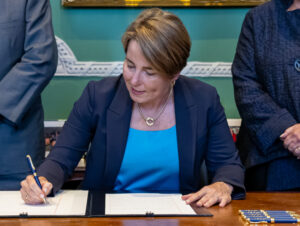Who is a member?
Our members are the local governments of Massachusetts and their elected and appointed leadership.

Gov. Maura Healey on July 29 signs a $57.8 billion state budget bill for fiscal 2025. (Photo courtesy Joshua Qualls/Governor’s Press Office)
Gov. Maura Healey today signed a $57.8 billion state budget bill for fiscal 2025 that increases unrestricted local aid by 3% over fiscal 2024 and boosts Chapter 70 education aid by approximately $309 million.
The budget was enacted by the Legislature on July 19. The governor vetoed $317 million in net spending and signed all but three outside sections into law.
The fiscal 2025 budget increases Unrestricted General Government Aid to $1.3 billion and Chapter 70 education aid to $6.9 billion. The budget leverages $37 million in Fair Share Amendment funding to raise the minimum new aid amount for Chapter 70 from $30 per student to $104 for fiscal 2025. These significant investments were MMA priorities during the budget process.
The budget creates a plan for $1.3 billion in Fair Share income surtax revenue, which can be spent on transportation and education programs. Notably, the plan includes $45 million for local road and bridge maintenance, which will provide critical supplemental funds to the Chapter 90 program.
The Division of Local Services will soon finalize local aid distributions for cities, towns and regional school districts based on the budget signed by the governor.
The state had been operating on an interim budget since the fiscal year began on July 1.
Appropriations
UGGA: Despite the current period of softening state revenue collections, the budget has good news for cities and towns, including the 3% increase for Unrestricted General Government Aid. With property taxes tightly capped by Proposition 2½, cities and towns rely on state revenue sharing to provide municipal and school services, ensure safe streets and neighborhoods, and maintain vital infrastructure.
Chapter 70: The budget commits to funding the Student Opportunity Act according to the originally intended schedule, with fiscal 2025 being year four of a six-year rollout. In recognition of the challenges facing “minimum aid” districts — nearly three-quarters of all school districts — which would have received only $30 per student above the previous year, the budget significantly increases minimum aid to $104.
Special education: To go along with $75 million from the fiscal 2023 closeout supplemental budget, the budget appropriates $492 million for the Special Education Circuit Breaker account, which reimburses school districts for the high cost of educating students with disabilities. The total fully funds the state’s obligation.
Charter schools: The budget includes $199 million for charter school mitigation payments, which funds the state’s statutory obligation as outlined in the Student Opportunity Act.
Rural schools: The budget includes $16 million for Rural School Aid to provide assistance to eligible towns and regional school districts. The grants will help schools that are facing the challenge of declining enrollment identify ways to form regional school districts or to regionalize certain school services to create efficiencies.
School transportation: The budget funds regional school transportation at $99.4 million, representing a reimbursement rate of 84% of fiscal 2025 costs as estimated by the Department of Elementary and Secondary Education. The budget funds the McKinney-Vento account for the transportation of homeless students at $28.6 million, and level funds out-of-district vocational transportation at $1 million.
PILOT: The budget funds payments-in-lieu-of-taxes for state-owned land at $53 million, an increase of $1.5 million over fiscal 2024.
Surtax revenue
The budget includes a spending plan for $1.3 billion in anticipated revenue from the voter-approved surtax on personal incomes over $1 million, known as the Fair Share Amendment, which is intended to fund education and transportation programs. This spending includes the following for municipalities:
• $45 million in supplemental aid to support the construction and maintenance of municipal roadways
• $170 million for the universal school meals program, which would provide free lunches at public schools for all students, regardless of household income
• $10 million for a Green School Works grant program to provide financial support to K-12 districts to install or maintain clean energy infrastructure, which will help to support local climate action and promote energy efficiency
Outside sections
The governor approved almost all outside sections that the Legislature attached to the budget, returning only three sections.
Tax title: Despite serious concerns raised by local officials and the MMA, the governor declined to take action on tax title provisions that create substantial legal exposure for municipalities, particularly provisions that are retroactive to two years before a related U.S. Supreme Court decision in May 2023.
Disaster relief fund: In welcome news for cities and towns, the budget includes an outside section to create a new Disaster Relief and Resiliency Fund, which would be funded with $14 million of a fiscal 2025 consolidated net surplus. This fund would be used to aid municipalities impacted by extreme weather events.